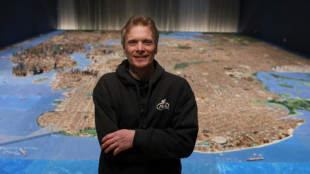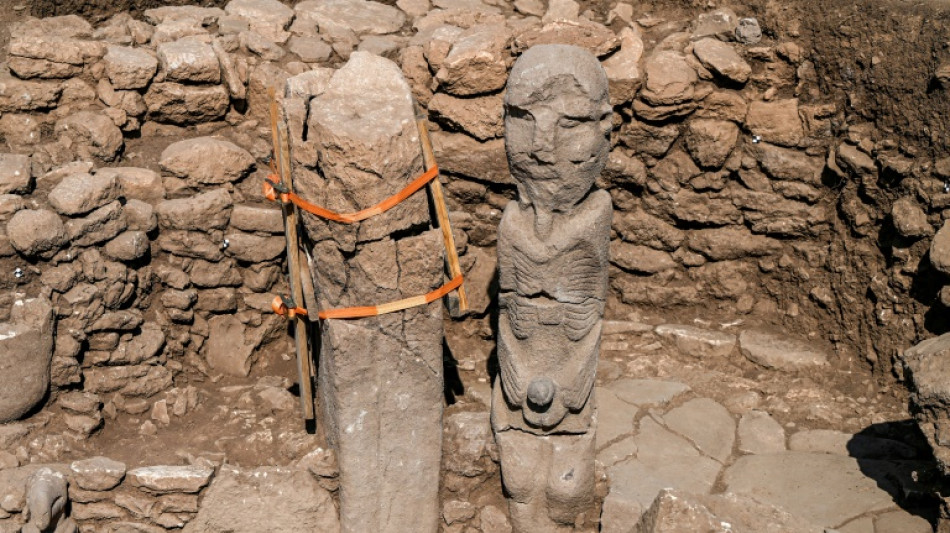
-
 More American women holding multiple jobs as high costs sting
More American women holding multiple jobs as high costs sting
-
Charcoal or solar panels? A tale of two Cubas
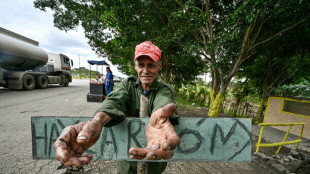
-
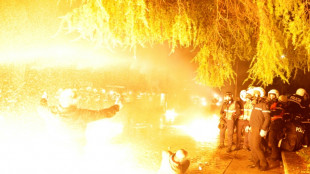 Several wounded in clashes at Albania opposition rally
Several wounded in clashes at Albania opposition rally
-
Chelsea's draw with Leeds 'bitter pill' for Rosenior

-
 'On autopilot': US skate star Malinin nears more Olympic gold
'On autopilot': US skate star Malinin nears more Olympic gold
-
Carrick frustrated by Man Utd's lack of sharpness in West Ham draw

-
 Frank confident of keeping Spurs job despite Newcastle defeat
Frank confident of keeping Spurs job despite Newcastle defeat
-
James's All-NBA streak ends as Lakers rule superstar out of Spurs clash

-
 Anti-Khamenei slogans in Tehran on eve of revolution anniversary: social media footage
Anti-Khamenei slogans in Tehran on eve of revolution anniversary: social media footage
-
YouTube says it is not social media in landmark addiction trial

-
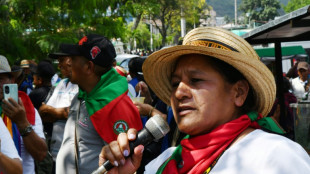 Colombian senator kidnapped, president targeted in election run-up
Colombian senator kidnapped, president targeted in election run-up
-
Britney Spears sells rights to her music catalog: US media

-
 West Ham end Man Utd's winning run, Spurs sink to 16th
West Ham end Man Utd's winning run, Spurs sink to 16th
-
US skate star Malinin leads after short programme in Olympics
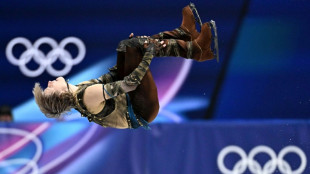
-
 Man Utd's Sesko strikes late to rescue West Ham draw
Man Utd's Sesko strikes late to rescue West Ham draw
-
Shiffrin flops at Winter Olympics as helmet row grows

-
 Celtics' Tatum practices with G League team but injury return uncertain
Celtics' Tatum practices with G League team but injury return uncertain
-
Gisele Pelicot publishes memoirs after rape trial ordeal

-
 Newcastle beat sorry Spurs to leave Frank on the brink
Newcastle beat sorry Spurs to leave Frank on the brink
-
'Outrage' as LGBTQ Pride flag removed from Stonewall monument

-
 Chappell Roan leaves agency headed by embattled 2028 Olympic chief
Chappell Roan leaves agency headed by embattled 2028 Olympic chief
-
Venezuelan authorities move Machado ally to house arrest

-
 YouTube rejects addiction claims in landmark social media trial
YouTube rejects addiction claims in landmark social media trial
-
Google turns to century-long debt to build AI

-
 'I felt guided by them': US skater Naumov remembers parents at Olympics
'I felt guided by them': US skater Naumov remembers parents at Olympics
-
Till death do us bark: Brazilian state lets pets be buried with owners

-
 Ukrainian athlete vows to wear banned helmet at Winter Olympics
Ukrainian athlete vows to wear banned helmet at Winter Olympics
-
'Confident' Pakistan ready for India blockbuster after USA win

-
 Latam-GPT: a Latin American AI to combat US-centric bias
Latam-GPT: a Latin American AI to combat US-centric bias
-
Gauff dumped out of Qatar Open, Swiatek, Rybakina through

-
 Paris officers accused of beating black producer to stand trial in November
Paris officers accused of beating black producer to stand trial in November
-
Istanbul bars rock bands accused of 'satanism'
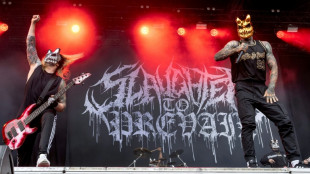
-
 Olympic bronze medal biathlete confesses affair on live TV
Olympic bronze medal biathlete confesses affair on live TV
-
US commerce chief admits Epstein Island lunch but denies closer ties

-
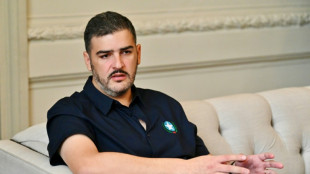 Mayor of Ecuador's biggest city arrested for money laundering
Mayor of Ecuador's biggest city arrested for money laundering
-
Farhan, spinners lead Pakistan to easy USA win in T20 World Cup

-
 Stocks mixed as muted US retail sales spur caution
Stocks mixed as muted US retail sales spur caution
-
Macron wants more EU joint borrowing: Could it happen?

-
 Shiffrin flops at Winter Olympics as helmet row simmers
Shiffrin flops at Winter Olympics as helmet row simmers
-
No excuses for Shiffrin after Olympic team combined flop

-
 Starmer says UK govt 'united', pressing on amid Epstein fallout
Starmer says UK govt 'united', pressing on amid Epstein fallout
-
Pool on wheels brings swim lessons to rural France

-
 Europe's Ariane 6 to launch Amazon constellation satellites into orbit
Europe's Ariane 6 to launch Amazon constellation satellites into orbit
-
Could the digital euro get a green light in 2026?

-
 Spain's Telefonica sells Chile unit in Latin America pullout
Spain's Telefonica sells Chile unit in Latin America pullout
-
'We've lost everything': Colombia floods kill 22

-
 Farhan propels Pakistan to 190-9 against USA in T20 World Cup
Farhan propels Pakistan to 190-9 against USA in T20 World Cup
-
US to scrap cornerstone of climate regulation this week

-
 Nepal call for India, England, Australia to play in Kathmandu
Nepal call for India, England, Australia to play in Kathmandu
-
Stocks rise but lacklustre US retail sales spur caution


Phallus and the boar: Turkey digs yield clues to human history
The dry expanses of southeastern Turkey, home to some of humanity's most ancient sites, have yielded fresh discoveries in the form of a stone phallus and a coloured boar.
For researchers, the carved statue of a man holding his phallus with two hands while seated atop a bench adorned with a leopard, is a new clue in the puzzle of our very beginnings.
The 2.3-meter (7.5-foot tall) work was discovered at the end of September at Karahantepe, in the heart of a complex of some 20 sites that were home to thousands of people during the Stone Age.
Karahantepe is part of the network around UNESCO-listed Gobekli Tepe, a place where our prehistoric ancestors gathered to worship more than 7,000 years before Stonehenge or the earliest Egyptian pyramids.
Necmi Karul, who heads the prehistory department at Istanbul University, found the toppled statue that was broken into three sections.
"We found several statues of this kind... but for the first time here we found the phallus," said the archaeologist, who coordinates the work of a project focused on the area's settlements.
The man lay in one of the first rectangular buildings, probably as a pillar supporting the wooden roof -- clues to how people used the site.
Karul said these settlements bear witness to "a new social order born after the Ice Age."
"The main reason to start a new kind of architecture is to build a new type of society," he noted.
- 150 more years of work -
Gobekli Tepe -- which some experts believe was never actually inhabited -- may be part of a vast sacred landscape that encompasses other nearby hilltop sites that archaeologists believe may be even older.
But the first modest photos of the statue released by Turkey's culture ministry led the local press to suspect censorship in the Muslim nation that has veered conservative under President Recep Tayyip Erdogan.
"We are archeologists, censorship doesn't exist! We had not yet found a phallus," the archaeologist said, laughing.
But there's meaning hidden in the discovery.
"Before leaving a site they (residents) used to crash the pillars and the statues -- but before, they broke the nose and the phallus," he said.
Then the site was filled in, buried under tonnes of sand and earth.
Its function remains unknown as do the reasons for the sudden abandonment and destruction of place after apparently hundreds of years of use.
The largest room at the site, surrounded by smaller rooms, seems to have been a kind of gathering place accessed via a narrow passageway, supported by a forest of phallus-shaped pillars topped by a man's head carved out of the rock.
"Those who entered here knew the symbols... they knew the meaning, it told them a story but we don't know it," he added, noting they have not found any female figures.
Perhaps they were made of wood, he noted, hazarding a guess.
No sooner had Karul unearthed the Karahantepe man, when he made another discovery the same week at Gobekli Tepe.
Archaeologists found a 1.2 metre long by 70 centimetre tall (4-foot by two-foot) depiction of a boar, with red eyes and teeth as well as a black-and-white body.
This 11,000-year-old wild pig is the first coloured sculpture from this period discovered to date, Karul said.
The site was occupied for some 1,500 years before being abandoned.
Of the 20 area sites in Tas Tepe (Stone Hills) project that is coordinated by Karul -- which stretches over 120 kilometres not far from the Syrian border -- only nine are being excavated.
"Work for the next 150 years", noted Karul, who has decided that both the man and the boar will remain where they emerged from the earth, but with the necessary measures to safeguard them.
T.Ibrahim--SF-PST

